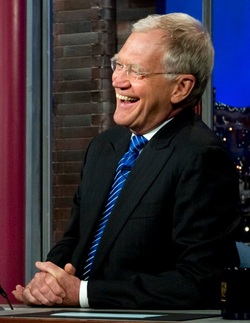
An excerpt from that interview (any errors in transcription are mine.):
ROSE: You get this award and there have been others but for 30 plus years of doing something you love.
LETTERMAN: Right
ROSE: That’s a nice way to go.
LETTERMAN: Well it is. . . I think how fortunate people are when you know what you want to do, and then you find a way to do it, and then you continue to do it for as long as you want. That’s great good luck. That’s great good luck because I think and I know a lot of people never really quite sure what they want to do, never quite sure what path they want to follow. And maybe they make themselves happy with whatever path they end up on.
Letterman sums up much about person-job match.
1. Finding what you want to do. Letterman discovered in a 10th grade speech class that he was good at extemporaneous speaking. He found a talent, found what he enjoyed, and then figured out what he could do with it.
2. Make those things happen. First on a local TV station broadcasting the weather, then driving an old pick-up truck to LA, doing standup, and earning an appearance on Johnny Carson’s “Tonight Show.” Letterman took risks and succeeded. It is not enough to know what you want to do. At some point one must act.
3. But he acknowledges a role for luck, that others may have similar stories but different outcomes. I have heard the same from other successful people. The right place at the right time.
We see luck in different ways. For many it may involve events over which we have absolutely no control. For others there may be preceding events unfolding in our lives that sow conditions for luck, both good and bad. “Hey, if I could only get a lucky break?” “That was really bad luck.” “I don’t believe in luck, you make your luck.” How you view luck will depend on your beliefs, most of which derive from your life experiences.
Hao Ma (2002) described types of luck in organizations. There is pure luck but there is also prepared luck. He wrote: “(prepared) luck is usually nothing but opportunities knocking upon those who are looking for them, who will notice them, and who will act on them. Luck favors the prepared mind. And luck favors those in action.” (p. 527).
Favors the prepared mind, favors those in action. Best of luck for the New Year.
Ma, Hao. (2002). Competitive advantage: What's luck got to do with it? Management Decision, 40, 525-536.
Image of David Letterman by Mass Communication Specialist 1st Class C. J. McNeeley, http://www.flickr.com/photos/thejointstaff/5830291
Free to share.
 RSS Feed
RSS Feed